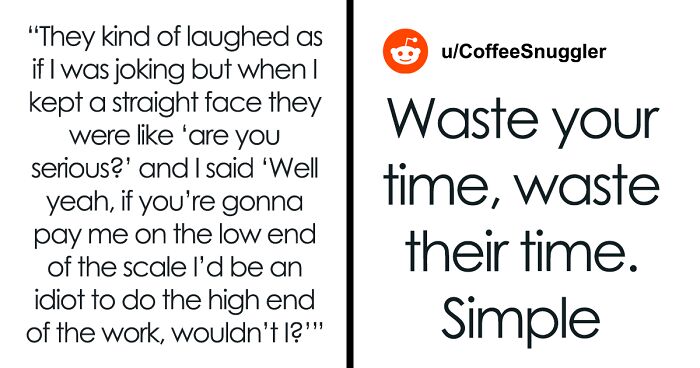
Job Candidate Tanks The Interview After Witnessing The Interviewer’s Attempt Of Lowballing
Interview With ExpertFinding a job is a tough task. You seem to send endless streams of resumes and cover letters to get at least a few interviews. And even when all of this goes smoothly, there might still be stuff that comes up and ruins it all.
Today’s story is a perfect example of this. In it, the person went through the whole process of getting a nice job with adequate pay. Sadly, it all went away quickly when it was revealed that the company wasn’t keeping its promises.
More info: Reddit
Getting a job is a tough task that takes a long time, and even after all that effort, it can end up being fruitless
Image credits: Los Muertos Crew (not the actual photo)
A person who applied was interviewed for a job that promised to pay the highest salary in their offered range
Image credits: Tima Miroshnichenko (not the actual photo)
But then, when the company offered them a job, they told them that they would pay only the lowest amount
Image credits: u/QueensOfTheThrownAge
So, instead of letting the company lowball them, the person said that if they’re going to get a low salary, they’re going to put little effort into the job
Today’s OP applied for a great-sounding job. This job’s posting specified what kind of salary they would offer candidates. The original poster didn’t specifically mention exact numbers — instead, they dubbed it in the $X-Y range.
Nowadays, more and more places are legally requiring employers to provide information about salaries in job postings. For example, in The European Union’s Pay Transparency Act, there’s apointabout pay transparency for job-seekers. It demands that employers provide information about the initial pay level or its range in the job description or at least before the job interview.
Staying compliant with the legal requirements isn’t the only benefit of including a salary in the job description. This type oftransparencyhelps the company to appear more transparent, strengthen its trustworthiness, and empower progress toward pay equality.
Also, as thissurveyreveals, many people don’t even apply for jobs if the salary isn’t disclosed. As it was pointed out in the comments under the post, people value their time, meaning they don’t want to go through the whole application process only to learn that the company is paying too little.
Just as The European Union’s Pay Transparency Act requires employers to declare their salary information, it also doesn’t let them ask job candidates about their pay history. Bored Panda’s interviewee, employment lawyer Milana Dostanitch, suggests not disclosing previous salary benefits as the candidate. “If an employer learns of a previous salary history, they can use that as a justification to lowball the candidate by only raising their offer by 10-15% from what they were previously paid.”
Yet, it doesn’t ban employers from asking about candidates’ salary expectations. Some say that thisquestionis one of the hardest to answer during job interviews. If a candidate says a number that is too small, they might end up making less than the company was willing to pay. And if they go too high, they can price themselves out of the job.
During their phone interview, the OP was asked this difficult question. They gave their response and were promised to be paid the largest amount of the offered range if they passed the interview process. For this to happen, they were invited to an in-person interview, during which they were offered a job. But that wasn’t the end.
Image credits: fauxels (not the actual photo)
Apparently, the company wasn’t planning to keep their promise. Instead of the highest amount in their range, they offered the lowest one. Their justification was that it was the only amount that fit the OP’s experience level. As our interviewee pointed out, there are no laws that prevent employers from offering salaries below market.
However, candidates should keep in mind that there are anti-discrimination laws. They prohibit employers from giving lower salaries to certain groups of people that fall into the protected categories of gender expression, sexual orientation, disability, and many others. “So, for instance, if an employer habitually lowballs women, paying them less, and habitually pays men more, that would be unlawful.”
If the candidate believes that they were lowballed because of the above reasons, they should seek a legal consultation from an employment attorney or even a government agency and learn about their rights. “This would help them determine if they can bring a discrimination claim against the employer.”
While the reason why the company tried lowballing the author isn’t that clear, they still weren’t planning to give in. They brought up the fact that it wasn’t the amount they were promised. They also cheekily added that if the company is planning to pay a low salary, they will put little effort into the job. You know, in the ballpark of treating others how you want to be treated.
At first, the recruiter took it as a joke, but they soon realized that the original poster wasn’t joking. It’s no surprise that the interview didn’t go much further.
Even though they didn’t get the job, they were able to see a silver lining in the whole situation. They felt like they gave “those LinkedIn weirdos” a dose of reality. People on Reddit agreed with this sentiment. They found the idea of “minimum pay, minimum effort” quite an ingenious way of negotiating. After all, negotiation is probably the best way to avoid getting lowballed on the pay you want.
Well, it’s sad that the OP didn’t get the nice job. On the other hand, maybe they dodged a bullet by refusing to work for a company that tends to trick people. And who knows, hopefully, with time, another job offer from a better company will come along.
Check out our interviewee’s Instagram and TikTok!
People online praised the person for not letting a scammy company walk all over them
Image credits: Sora Shimazaki (not the actual photo)
Image credits: Christina Morillo (not the actual photo)
Poll Question
Thanks! Check out the results:
I witnessed this exact sort of stupidity just the other day. A company brought on a mess of temps, promising that there was one position available at the end of their assignment so they'd fight over it. Turned out the position was for a completely different (and much harder) job, for lower pay, and they'd have to wait years to get back "up" to the job they'd been brought on to do as the company based 100% of their staffing decisions on seniority at that level. I was one of the temps who got that insulting offer, and needless to say I did not take it.
SEVEN rounds of interviews‽ I would never have put up for that. I have never had more than two interviews, and even two was rare. If you need seven interviews to decide if I'm the right candidate for the job, that tells me your leadership has very poor decision making and time management skills, and this job is going to be one giant cluster of hemorrhoids.
It's becoming ridiculously common. The initial rounds of interviews aren't even with anyone with power to hire. They're just weeding out the chaff to send the best candidates to the hiring panel and then there's often some administrator who wants to have input but couldn't bother to be a part of the actual interviews so has to do another of their own. There's no standard, so there's no telling how many there will be once you get started unless the potential employer is very open about their hiring practice in advance, which I've only seen once.
Load More Replies...Interviewers always ask me what's the lowest I'd accept. When I ask why, they say to make sure that it's in their range so we're not wasting anyone's time. I always reply "tell me the highest you'll pay and I'll tell you if it's enough." They never do 🤣
I got threatened with a written warning this week because I needed to WFH one day - everyone but the big boss knew and when inevitably his golden child was struggling to cope, I once again got a finger pointed. Took that chat, then yesterday said I would directly inform him next time but this being a second time of me being told off because I created pressure shows how much of their slack I am picking up and one day it might not be WFH but hit by a bus and what then?
Sounds like maybe it's time for you to stop being the golden child's training wheels. Then the boss won't see them crash and burn only while you are away. :x
Load More Replies...When I retired, my phone started ringing off the hook. It still is. Mostly 6 month-12 month assignments, no benefits, no time off, no per-diem, and the rates were not very good. I had a non-specific offer from a major Engineering company to work at Cape Canaveral for 12 months. No rate. I told them my minimum requirements (which included per-diem), and they said, "Well, it's all negotiable. Why don't you come on down here and we can discuss it?" Problem was, they were not paying my expenses. Next!
A contractor sought out and courted my husband, trying to poach him from a cushy state job where he is our state's expert in his field. He went through a ridiculous number of interviews with them, even meeting with the owner. They acted like they really, really wanted him, but when the offer came in, it was at the same salary the state was paying him, but without the benefits. My husband initially thought it was a joke, it was so insulting. It was also probably for the best because that contractor worked for several states and one day just up and abandoned all of their contracts and all of their employees with no notice at all, leaving hundreds suddenly unemployed and numerous agencies across multiple states suddenly with legal liability to perform the duties they had hired the contractor to perform.
That person complaining their job recruiter was playing games doesn't know how it works. The higher salary the recruiter negotiates for your new role, the higher commission they make from the hiring company. So what really happened is the company lowballed by $10k, the person shockingly refused, then they reached out separately and were willing to pay a bit more to a) keep them interested and b) they don't have to pay the recruiters commission anymore.
Makes sense in theory, but I've never actually seen it work that way.
Load More Replies...I witnessed this exact sort of stupidity just the other day. A company brought on a mess of temps, promising that there was one position available at the end of their assignment so they'd fight over it. Turned out the position was for a completely different (and much harder) job, for lower pay, and they'd have to wait years to get back "up" to the job they'd been brought on to do as the company based 100% of their staffing decisions on seniority at that level. I was one of the temps who got that insulting offer, and needless to say I did not take it.
SEVEN rounds of interviews‽ I would never have put up for that. I have never had more than two interviews, and even two was rare. If you need seven interviews to decide if I'm the right candidate for the job, that tells me your leadership has very poor decision making and time management skills, and this job is going to be one giant cluster of hemorrhoids.
It's becoming ridiculously common. The initial rounds of interviews aren't even with anyone with power to hire. They're just weeding out the chaff to send the best candidates to the hiring panel and then there's often some administrator who wants to have input but couldn't bother to be a part of the actual interviews so has to do another of their own. There's no standard, so there's no telling how many there will be once you get started unless the potential employer is very open about their hiring practice in advance, which I've only seen once.
Load More Replies...Interviewers always ask me what's the lowest I'd accept. When I ask why, they say to make sure that it's in their range so we're not wasting anyone's time. I always reply "tell me the highest you'll pay and I'll tell you if it's enough." They never do 🤣
I got threatened with a written warning this week because I needed to WFH one day - everyone but the big boss knew and when inevitably his golden child was struggling to cope, I once again got a finger pointed. Took that chat, then yesterday said I would directly inform him next time but this being a second time of me being told off because I created pressure shows how much of their slack I am picking up and one day it might not be WFH but hit by a bus and what then?
Sounds like maybe it's time for you to stop being the golden child's training wheels. Then the boss won't see them crash and burn only while you are away. :x
Load More Replies...When I retired, my phone started ringing off the hook. It still is. Mostly 6 month-12 month assignments, no benefits, no time off, no per-diem, and the rates were not very good. I had a non-specific offer from a major Engineering company to work at Cape Canaveral for 12 months. No rate. I told them my minimum requirements (which included per-diem), and they said, "Well, it's all negotiable. Why don't you come on down here and we can discuss it?" Problem was, they were not paying my expenses. Next!
A contractor sought out and courted my husband, trying to poach him from a cushy state job where he is our state's expert in his field. He went through a ridiculous number of interviews with them, even meeting with the owner. They acted like they really, really wanted him, but when the offer came in, it was at the same salary the state was paying him, but without the benefits. My husband initially thought it was a joke, it was so insulting. It was also probably for the best because that contractor worked for several states and one day just up and abandoned all of their contracts and all of their employees with no notice at all, leaving hundreds suddenly unemployed and numerous agencies across multiple states suddenly with legal liability to perform the duties they had hired the contractor to perform.
That person complaining their job recruiter was playing games doesn't know how it works. The higher salary the recruiter negotiates for your new role, the higher commission they make from the hiring company. So what really happened is the company lowballed by $10k, the person shockingly refused, then they reached out separately and were willing to pay a bit more to a) keep them interested and b) they don't have to pay the recruiters commission anymore.
Makes sense in theory, but I've never actually seen it work that way.
Load More Replies...
 Dark Mode
Dark Mode 

 No fees, cancel anytime
No fees, cancel anytime 







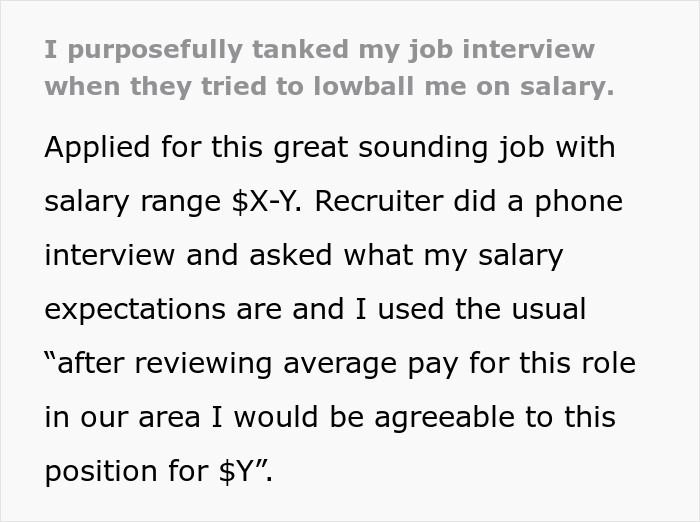


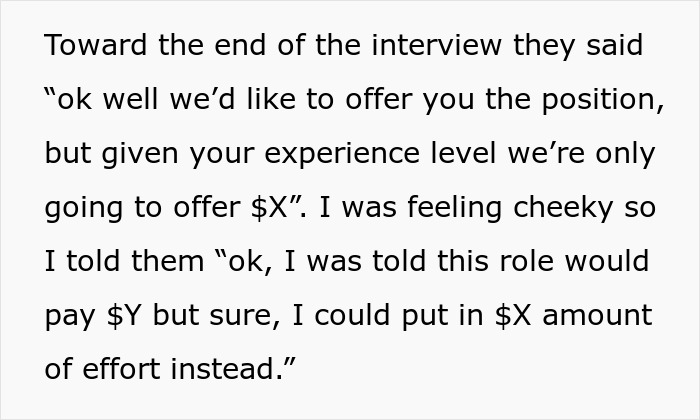
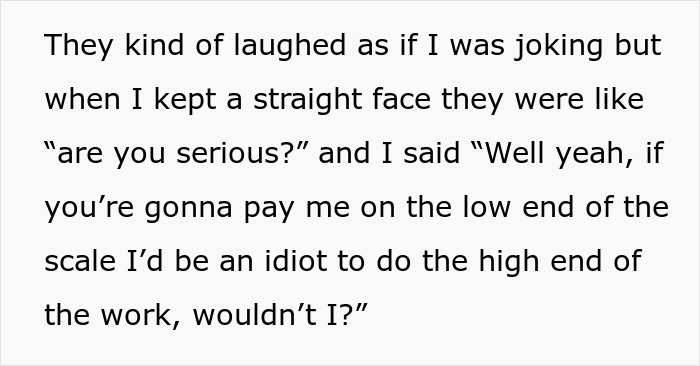
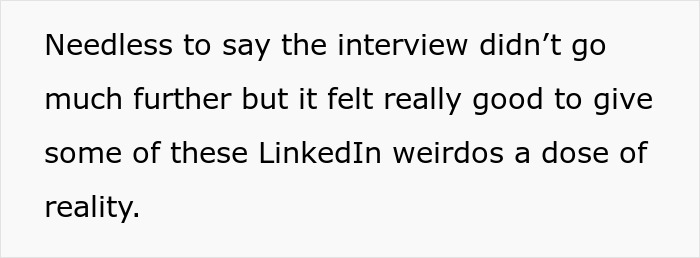

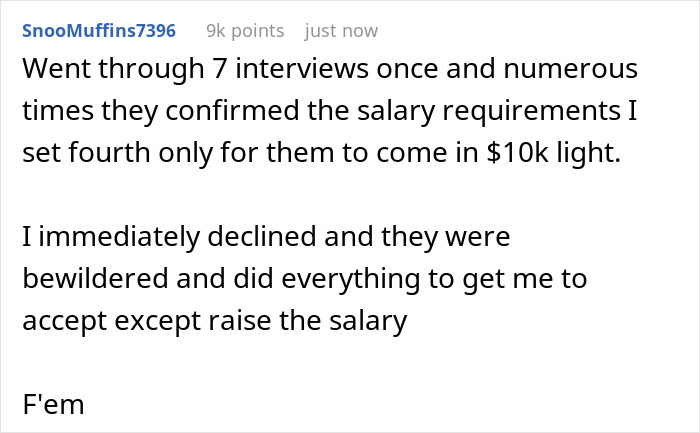
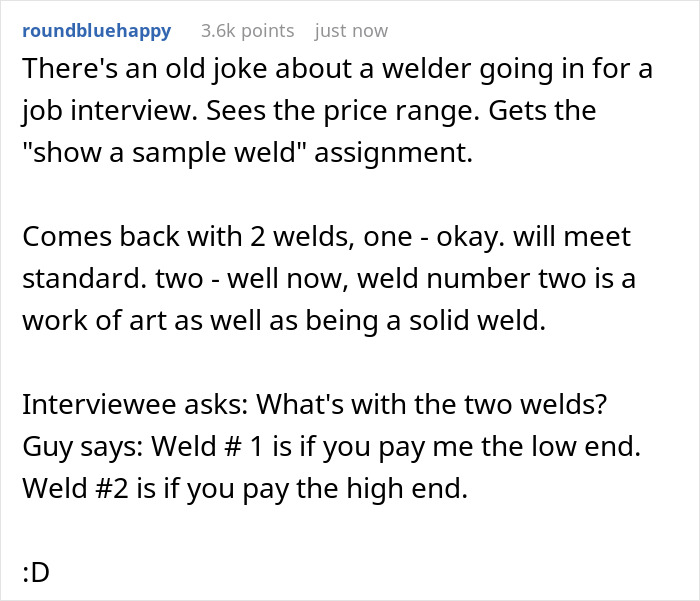
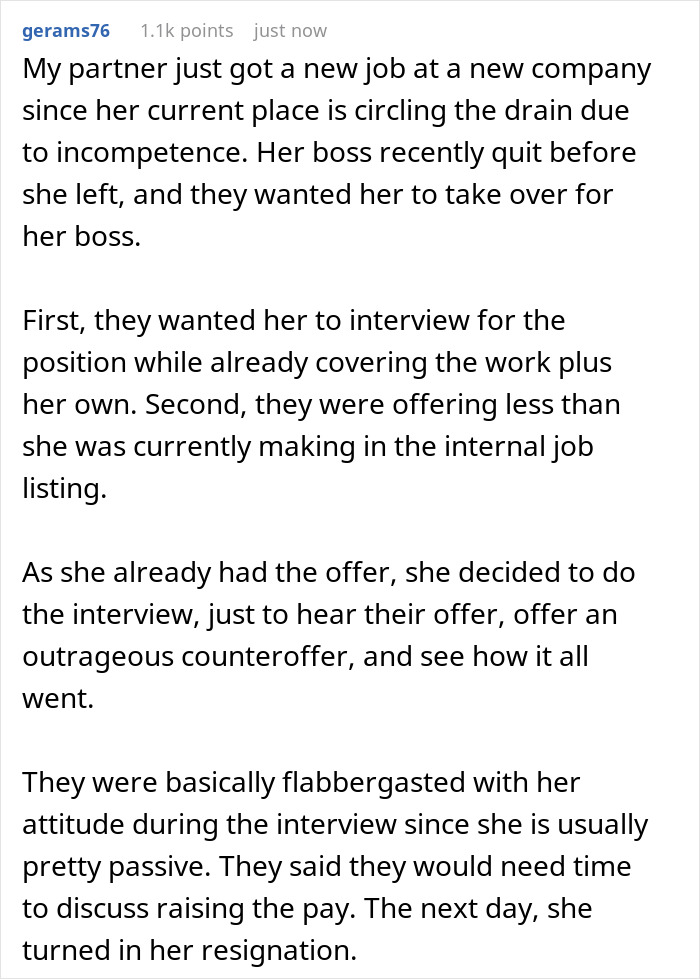

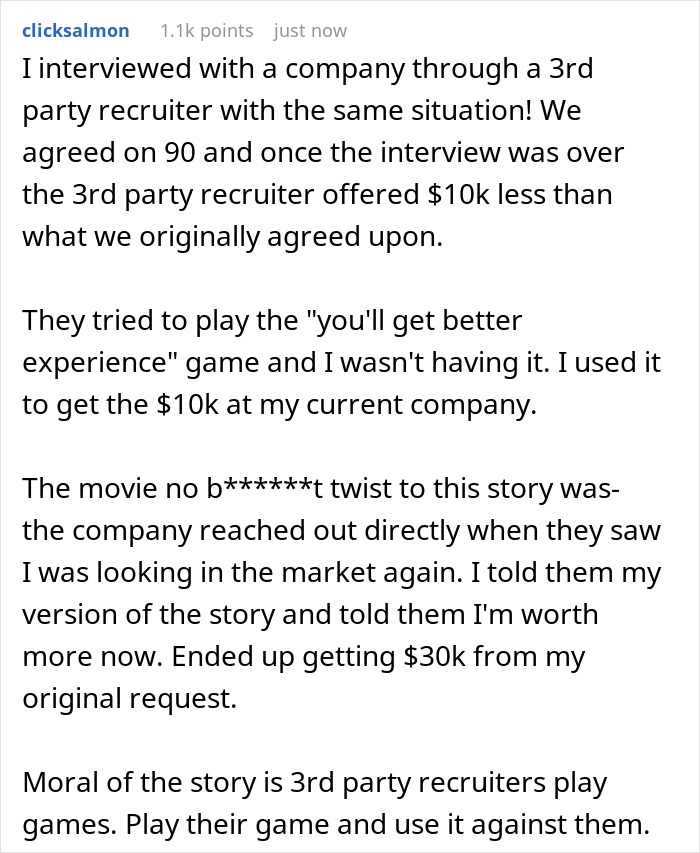

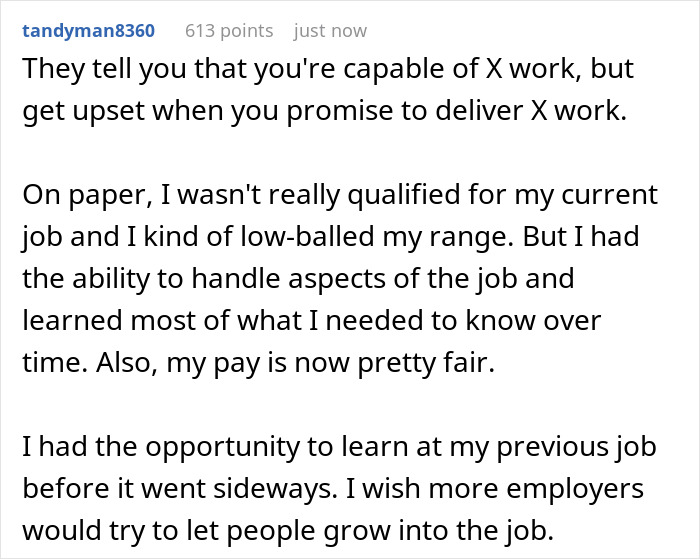

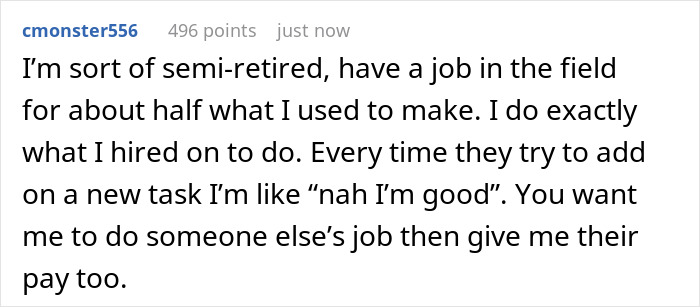















































39
16